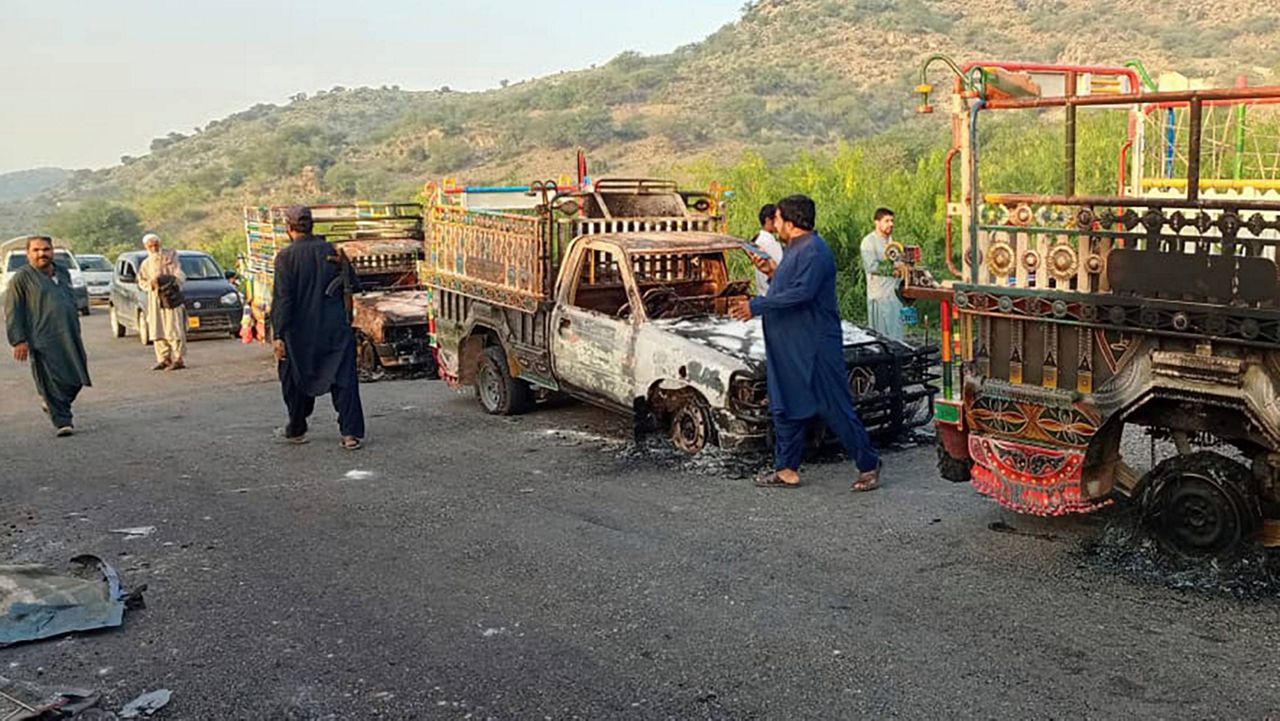Gunmen in southwestern Pakistan killed at least 37 people in three separate attacks on Monday, officials said, while security forces killed 12 insurgents, marking one of the deadliest days of violence in the restive Baluchistan province, with reports of other shootings and destruction in the area.
What You Need To Know
- Police and officials in Pakistan say gunmen in the country's restive southwest have killed at least 37 people in three separate attacks
- Twenty-three people were fatally shot on Monday morning after being taken from buses, vehicles and trucks in Musakhail, a district in Baluchistan province
- Police say the attackers burned at least 10 vehicles before fleeing
- In a separate attack, gunmen killed at least nine people, including four police officers and five passersby, in Qalat district also in Baluchistan
Twenty-three people were fatally shot overnight after being identified and taken from buses, vehicles and trucks in Musakhail, a district in Baluchistan, senior police official Ayub Achakzai said. The attackers burned at least 10 vehicles before fleeing.
In a separate attack, gunmen killed at least nine people, including four police officers and five passersby, in Baluchistan's Qalat district, authorities said. The bodies of six people were found in Bolan, where insurgents also blew up a railway track, attacked a police station in Mastung and attacked and burned vehicles in Gwadar, all districts in Baluchistan. No casualties were reported in those attacks.
Baluchistan has been the scene of a long-running insurgency in Pakistan, with an array of separatist groups staging attacks, mainly on security forces. The separatists have been demanding independence from the central government in Islamabad. Although Pakistani authorities say they have quelled the insurgency, violence in Baluchistan has persisted.
The attack in Musakhail came hours after the outlawed Baluch Liberation Army separatist group warned people to stay away from highways as they launched attacks on security forces in various parts of the province.
But there there was no immediate claim of responsibility for the latest killings.
In a statement on Monday, the BLA only said it inflicted heavy losses on security forces in attacks in the province. Pakistan's military and government did not immediately comment on that claim. The group often provides exaggerated figures of troop casualties.
Separatists are known to ask people for their ID cards, and then abduct or kill those who are from outside the province. Many recent victims have come from neighboring Punjab province.
Uzma Bukhari, a spokesperson for the Punjab provincial government, denounced the latest killings on Monday, saying the "attacks are a matter of grave concern" and urging the Baluchistan provincial government to "step up efforts to eliminate BLA terrorists."
Interior Minister Mohsin Naqvi said in a statement that security forces in Baluchistan responded to the latest attacks on Monday, killing 12 insurgents. He said authorities would reveal who was behind the latest attacks after completing an investigation, but noted that "terrorists and their facilitators will have no place to hide" in the country.
Pakistani President Asif Ali Zardari, Prime Minister Shehbaz Sharif and Interior Minister Naqvi in separate statements called the attack in Musakhail "barbaric" and vowed that those behind it would not escape justice.
Later, Naqvi also condemned the killings in Qalat
In May, gunmen fatally shot seven barbers in Gwadar, a port city in Baluchistan.
In April, separatists killed nine people after abducting them from a bus on a highway in Baluchistan, and the attackers also killed two people and wounded six in another car they forced to stop. BLA claimed responsibility for those attacks at the time.
Syed Muhammad Ali, an Islamabad-based security analyst, said the latest killings of non-Baluch people are an attempt by separatists to harm the province economically.
Ali told The Associated Press that most such attacks are carried out with the aim to economically weaken Baluchistan, noting that "the weakening of Baluchistan means the weakening of Pakistan."
He said insurgent attacks could hamper development work being done in the province.
Separatists in Baluchistan have often killed workers and others from the country's eastern Punjab region as part of a campaign to force them to leave the province, which for years has experienced a low-level insurgency.
Most such previous killings have been blamed on the outlawed group and others demanding independence from the central government in Islamabad. The Pakistani Taliban also have a presence in the province, and they are closely connected to the BLA.
In a separate attack on Monday in the northwestern Khyber Pakhtunkhwa province, a roadside bomb killed four people and wounded 12 others in North Waziristan district, said local administration official Abid Khan.
The Pakistani Taliban, known as Tehreek-e-Taliban Pakistan, is a separate group but allied with the Afghan Taliban, who seized power in Afghanistan in 2021 as U.S. and NATO troops were in the final stages of their pullout from the country after 20 years of war.



